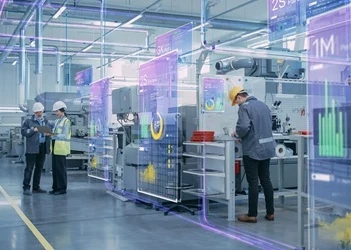Once, Drucker told us the story of a CEO who made an unusual proposal. "Management is getting more and more complex," he told his staff. "Recently I’ve learned of the capabilities of the latest computers, and I think we can implement a new concept which can give us a significant competitive advantage."
"The idea," he continued, "is to list all of the primary factors which affect our business. We’ll use computers to see how these factors work individually and together to create various quantified outputs."
"For example, if the economy changes, it may increase demands for certain of our products. No doubt our competitors will see the same changes and increases. The difference will be in response. Do we lower price? Do we raise it? Do we increase our research and develop expenditures? Decrease them? Some combination? Every change we make affects other important aspects of running our business. We’ll be able to immediately see the changes in output caused by the external environmental or changes we cause ourselves in order to take advantages of these opportunities and to best achieve our business objectives and to affect our overall performance positively. Most importantly, the computer will generate an array of actions for us according to whatever objectives are set and whatever resources are available.
"First, we need to decide which factors primarily affect what we do. I know there are many and they affect all of the functional areas, including finance marketing, manufacturing and more. Of course there are external factors as well, including our competition, the state of the economy and the business in our industry. We’ll turn all of this data over to computer experts to develop the program. It may take us some time and cost us some money, but it will be worth it. In the end the computer will tell us exactly what to do in every situation."
The Challenge
"This is a homework assignment," Peter continued. "Please consider two questions. First I would like you to consider the input factors affecting performance both from within a company, and in its external environment that should be considered and how they would be measured. These are those that the president of this company said will be turned over to those qualified to quantify this information and determine their relationship with performance output. Second, please think through and list the advantages and disadvantages of the president’s proposal. We will discuss your conclusions in class next week.
Meeting the Challenge
I talked with several managers within my own company. Although computer systems were not my area of expertise, I knew that a large amount of data was collected and analyzed in the department in which I worked, and I got all the information I could. Remember, this was several years before the rise of the information systems, or chief information officers. We were using a lot of this information in our decision making, but it was not integrated with other functional areas as suggested by the president in Peter’s case study, and it certainly wasn’t formatted in such a manner that it would automatically yield the required actions to be taken based on the constraints of the situations and the resources inputted by the company.
Advantages and Disadvantages
It seemed to me that the advantages were so self-evident that they far out weighed the cost of putting the whole system together. Primarily the advantages I listed were that the company would be able to act proactively and react to external forces better and faster than any competitor. It would come up with the correct action to take in every situation.
[inlinead]
The Classroom Discussion
"This Management Control Panel is a terrific concept!" one student blurted out. "Was this something that you developed for one of your clients?" Peter didn’t answer the question. "Let’s defer questions of this kind until we discuss the case. Since you are all eager to get started, we’ll begin immediately with the first question. Who would like to tell us his list of inputs?"
The first student’s list was quite long. I thought mine was lengthy, maybe too long. I had pruned my list to about fifteen items. I had purposely sought only what I thought to be the main inputs affecting performance output, recognizing that there would be a cost associated with each measurement. However, I noticed others writing down inputs they had omitted as the student holding the floor proceeded to announce his suggested inputs.
Drucker listened without comment and then called on someone else. This student had a number of items which the first student had not used. After asking this student’s industry, Peter repeated the process several times. However, it soon became evident that a complete list was almost infinite, depending on your tolerance for using more and more inputs, and also that different industries probably considered different inputs more important than others. After several students, Drucker stopped calling on volunteers.
The Real Disadvantages
"I think we can conclude that the number of inputs is limited only by our imaginations, but that companies in different industries will consider different inputs from both the internal and external environments to be basic drivers to output and should be included," Peter said.
"This is as we might expect. Basic requirements are different in different businesses; core competencies, strengths and weaknesses vary from company to company and are part of this picture. Let’s leave this for a moment except to conclude that this information and their interaction is extremely useful for a manager making decisions and taking actions to reach the goals he has set to accomplish. Now, tell me please, what are the advantages and disadvantages of the Management Control Panel which the president proposes."
The answers to this question were less surprising. Of course, the more inputs that were included, the more complex the system and the more costly to assemble. However, considering the benefits offered, The Management Control Panel had everything to recommend it. By consensus, it was worth the price irrespective of cost. One student added, however, that such a system, delineating the actions that management was to take and leaving only implementation, eliminated much of management decision-making. Peter nodded his agreement, but did not respond further to this statement.
Peter now paused. "Earlier someone asked me whether The Management Control Panel was something that I developed for one of my consulting clients. I deferred from answering, but I will answer now. Not only was The Management Control Panel not something that I proposed or developed, it was an idea suggested by a client which I opposed until the idea was finally dropped."
The Unworkable Management Control Panel
"The Management Control Panel is not a good concept because it is unworkable. No matter how many inputs, there are always additional factors which cannot be included and cannot be quantified in any given situation. These factors might be the personality of one or more of the prime executives, recent experience, either good or bad, or even the weather on a given day. It doesn’t take much, and most of these factors are random and unpredictable. Yet a single factor, sometimes differing only slightly, can cause entirely different results from those desired. Therefore the results of such a system must be unreliable and misleading.
"Now the idea of a Management Information Panel is very good. Being able to view the spectrum of the internal and external environments, and even understanding the relationships between them if one takes certain actions is extremely valuable. However, analyzing these variables and thinking you will obtain consistently repeatable results through exact actions depending on inputs will invariably lead to disaster. It is always the manager that must take the information provided, including a computer’s analysis, and make a judgment as to what decisions to take.
It has been said that the human brain is the world’s best computer. This is only partially true, since a computer can make accurate and precise calculations much faster. However, human beings have something else which combined with the human brain makes its use a requirement and superior to the use of a computer by itself. This is the manager’s gut feel and instinct as to what is important and critical in any situation and what must be considered primary and what can be safely ignored."
Use of technology and automation to gain assistance in making decisions is important, but this cannot replace the manager in making the final analysis and determining the actions which any organization must follow to lead to success. "A manager’s so called "gut decisions" based on his experience, knowledge, and known information is usually far superior to a computer’s analysis of based on probability since the computer lack’s the judgment of the manager which incorporates all this and more.".
*Adapted from A Class with Drucker (AMACOM, 2008)























